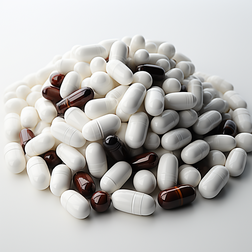Does tadalafil lower or increase blood pressure?
- Introduction to Tadalafil
- Recognizing and Responding to Symptoms of Hypotension
- The Relationship Between Tadalafil and Blood Pressure
- Studies and Findings on the Impact of Tadalafil on Blood Pressure
- Consultation and Guidance from Healthcare Providers
- Impact of Low Dose Tadalafil (5 mg daily) on Blood Pressure Control and Erectile Function in Hypertensive Patients
- Risks and Cautions: Co-administration of Tadalafil and Doxazosin
- Understanding PDE5 Inhibitors and Their Vasodilating Effects
- Tadalafil's Effects on Pulmonary Blood Pressure
- Tadalafil's Hypotensive Effects in Specific Scenarios: Health Conditions and Other Drugs
- Tadalafil's Role in Treating Erectile Dysfunction and Pulmonary Arterial Hypertension
- The Effect of a Single Dose of Tadalafil (20 mg) on Blood Pressure
- Does Tadalafil Lower or Increase Blood Pressure?
- Is Tadalafil Bad for Your Heart?
- Why Does Tadalafil Increase BP?

Introduction to Tadalafil
Tadalafil is a popular medication best known for its use in treating erectile dysfunction and pulmonary arterial hypertension. It is classified as a PDE5 inhibitor, which is a class of drugs that block the enzyme PDE5 and ultimately improve blood flow. While commonly associated with managing sexual health issues, tadalafil's influence on blood vessels has potential implications on systemic blood pressure as well.
Recognizing and Responding to Symptoms of Hypotension
Hypotension, or low blood pressure, is a medical condition that can be influenced by numerous factors including certain medications. Symptoms may vary from person to person, but commonly reported signs include poor concentration, blurry vision, cold and clammy pale skin, difficulty breathing, fatigue, and depression. It's crucial to recognize these symptoms and seek medical advice as soon as possible to prevent potentially serious health issues.
The Relationship Between Tadalafil and Blood Pressure
In essence, tadalafil impacts blood pressure due to its ability to relax and widen blood vessels. This vasodilation effect allows blood to flow more easily, which may lead to a decrease in systemic blood pressure. It is, however, vital to note that the drug's impact can vary based on an individual's health status, the presence of other medical conditions, and concurrent use of other drugs.
Studies and Findings on the Impact of Tadalafil on Blood Pressure
Numerous studies have been conducted to evaluate the effect of tadalafil on blood pressure. Some findings indicate that tadalafil can modestly decrease systemic blood pressure in healthy men. Yet, more research is needed to fully understand this impact, especially in individuals with existing hypertension or other underlying health conditions.
Consultation and Guidance from Healthcare Providers
Due to the potential impact of tadalafil on blood pressure, it's essential for patients to consult with a healthcare provider before starting the medication. This helps ensure the drug is safe for the individual's health status and will not interact negatively with other drugs they may be taking.
Impact of Low Dose Tadalafil (5 mg daily) on Blood Pressure Control and Erectile Function in Hypertensive Patients
Low dose tadalafil, commonly prescribed as a 5 mg daily dose, has shown potential in managing both erectile dysfunction and blood pressure. Some studies suggest that this dosage can lead to a small decrease in systemic blood pressure in hypertensive patients without causing serious hypotensive effects. More research is needed to confirm these findings and fully understand the implications of long-term use.
Risks and Cautions: Co-administration of Tadalafil and Doxazosin
Co-administration of tadalafil with antihypertensive medications like doxazosin, an alpha-blocker, requires caution. Both drugs can lower blood pressure and their simultaneous use may lead to an exaggerated hypotensive response. It's critical for patients to discuss with their healthcare provider if they are taking doxazosin or similar medications.
Understanding PDE5 Inhibitors and Their Vasodilating Effects
PDE5 inhibitors, including tadalafil, have a key role in controlling the diameter of blood vessels. By blocking the PDE5 enzyme, these drugs facilitate the relaxation of smooth muscle cells in the blood vessels, leading to vasodilation and potentially lower blood pressure.
Tadalafil's Effects on Pulmonary Blood Pressure
Beyond systemic blood pressure, tadalafil has been shown to impact pulmonary blood pressure.
By promoting the dilation of blood vessels in the lungs, tadalafil can help reduce pulmonary arterial hypertension, a serious and potentially life-threatening condition.
Tadalafil's Hypotensive Effects in Specific Scenarios: Health Conditions and Other Drugs
In certain scenarios, tadalafil's hypotensive effects may become particularly pronounced. For instance, in patients with certain medical conditions or those taking other drugs that also lower blood pressure, tadalafil may cause a significant drop in systemic blood pressure. As such, it's vital to thoroughly discuss one's medical history and current medications with a healthcare provider before beginning tadalafil.
Tadalafil's Role in Treating Erectile Dysfunction and Pulmonary Arterial Hypertension
Tadalafil has a dual role in treating erectile dysfunction and pulmonary arterial hypertension. Its ability to increase blood flow helps manage erectile dysfunction, while its vasodilating effects can alleviate pulmonary arterial hypertension. However, it's crucial to understand that these benefits come with potential side effects, including possible changes in systemic blood pressure.
The Effect of a Single Dose of Tadalafil (20 mg) on Blood Pressure
A single dose of tadalafil, typically at 20 mg, can potentially lower blood pressure. However, this effect is usually mild and may not be noticeable in all individuals. Those with hypertension may not find this dosage sufficient to replace their antihypertensive medications.
Does Tadalafil Lower or Increase Blood Pressure?
Based on current evidence, tadalafil generally tends to lower blood pressure slightly due to its vasodilating effects. However, the impact on blood pressure can vary among individuals, and factors such as existing medical conditions, use of other medications, and individual physiology can influence the response to the drug.
Is Tadalafil Bad for Your Heart?
Regarding the potential cardiac effects, tadalafil, like other PDE5 inhibitors, is generally safe for heart health in people without underlying cardiac conditions. However, it may pose risks for individuals with certain heart conditions, and it should be used with caution in these cases. Always consult a healthcare provider for personalized advice.
Why Does Tadalafil Increase BP?
Contrary to this, tadalafil typically does not increase blood pressure. It usually decreases blood pressure slightly due to its vasodilating effects. If blood pressure increases while using tadalafil, it could be due to other factors and should be evaluated by a healthcare provider.
Overall, the impact of tadalafil on blood pressure is a complex topic that depends on various factors. It's always best to consult with a healthcare provider for personalized advice regarding the use of this medication. They can provide guidance based on your individual health status and needs, ensuring the safest and most effective use of the drug.



